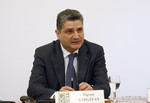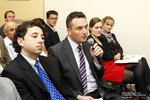Wednesday, 6 June 2012
PM Answers Questions Of Interest To Political Analysts, Journalists
On the sidelines of his June 3-5 visit to the Kingdom of Belgium, Prime Minister Tigran Sargsyan called at the Center of European Policy Studies (CEPS) in Brussels where he delivered a statement and answered the questions of interest to European, Turkish and Azerbaijani political analysts and news reporters.
Question: Mr. Prime Minister, what are the peculiarities of Armenia’s anti-corruption campaign? Why should you succeed right now?
Prime Minister Tigran Sargsyan - We have opted for a very clear strategy. We must aim at those key targets that can lead to success in our anti-corruption campaign. We are not so much concerned about the number of measures to be taken but rather about their effectiveness. We must start the campaign at the very top.
We have targeted 500 high-ranking officials, and if they work in a transparent manner that is publicly monitored and if their incomes are scrutinized, it will drastically reduce corruption risks.
In addition, this will decrease the desire of entrepreneurs to seek appointment to these 500 positions. It was with the backing of the President of Armenia that we were able to push this bill through the parliament.
For the first time, an ethics commission has been established this year to assume the monitoring of income statements by these government officials.
Today, all the 131 members of parliament, judges and prosecutors must submit income and asset returns. The commission must respond in all cases where the public sees that the reports do not correspond to the facts. It is to be noted that these disclosure reports are made available to the public on-line.
In this way, we are placing a straight jacket on these officials. I am convinced that transparency is the best way to fight corruption.
This is the pledge of our success. Our deeds and remarks should meet each other. I am confident that we are in for a heated debate over these 500 public officials’ income statements.
Besides, we have exposed the statements of major businesses so that the citizens could trace them down online. If an oligarch fails to pay what is due he may become subject of public discussion.
For the first time, we have obliged major businesses to base their statements on the findings of external auditors. This will allow the public to monitor the State by making sure that the latter brings major businesses into the tax field. Today, the public wants to know how come our businessmen make benevolences while they pay so little taxes.
Question: Mr. Prime Minister, everyone knows the successful attempt of Georgia to fight corruption. Why is it not being applied in Armenia?
Prime Minister Tigran Sargsyan – The answer is a simple one. The revolutionary road leading to change is unacceptable in Armenia. We abide by the evolutionary path toward transformations. It will take longer but will guarantee stability. This is a priority to us considering our relations with the next-door neighbors.
When we conduct reforms, we always appraise our internal capabilities. The geopolitical situation largely reduces our potential. This is why our strategy implies long-term objectives which is perhaps more painful
What is the problem we face? We have a small stratum of very rich people and a large layer of the poor. But it is the middle class that pushes society forward and it is weak in today’s Armenia.
Thus, our goal is to bring the very rich under supervision and make their actions transparent and open, while at the same time creating favorable conditions for small and medium business. We regard this as the best strategy for eliminating poverty.
Question: U.S. Secretary of State Hillary Clinton is going to arrive in Armenia. What are the goals behind her upcoming visit and whether the Armenian-Turkish relations will be on the agenda? (The Prime Minister’s briefing was held on June 4. Just the same day the U.S. State Secretary arrived in Armenia).
Prime Minister Tigran Sargsyan - As far Mrs. Clinton’s visit is concerned, it should be noted that the U.S.-Armenia relations have been raised to an unprecedented high level during the term of presidents Sargsyan and Obama.
Our relations were shaped in an atmosphere of mutual understanding and there are no such political issues over which we cannot come to agreement.
Armenia – Turkey relations will be on the agenda. You may know that Armenia has honored all of its commitments assumed under the protocols signed in Switzerland. As Mrs. Clinton put it, the ball is in Turkey’s court.
I think that Turkey wants to normalize its relations with its neighbors: It is no secret that Turkey has serious political ambitions in the region, but it also means that it should be able to normalize its relations with all neighbors:
It remains to see on which platform Turkey wants to normalize its relations with the neighbors. As for Armenia, our position has not changed over the last 20 years.
We are ready to normalize our relations with Turkey without preconditions, to establish diplomatic relations and open borders with Turkey. As soccer diplomacy showed, Turkey is not yet ready to do so. I think the only way for Turkey is to build the relations with its neighbors on a single system of values.
From this perspective, we are eager to see our neighbors implement reforms based on the European system of values. This is the pledge of security and cooperation in the region.
Question: What is the impact of the Armenian Diaspora on the economy of Armenia? We know about the huge amounts of money transfers going to Armenia. What is the impact of these transfers?
Prime Minister Tigran Sargsyan – Remittances are vital to Armenia. There is an interesting factor at play. While the population of Armenia being 3 million, there are some 6 million outside the country. Those making remittances are the ones who left Armenia during the past twenty years and not those 4-5 million who are the descendants of the 1915 Genocide survivors.
95% of the old emigrants have never been to Armenia while they possess a great potential to spur up the economy. While they have never been to Armenia they live in the Armenian world and have their churches, political parties, schools, etc.
We have designed a new strategy to tap on that potential. At the initiative of President Sargsyan, we have set up the Ministry of Diaspora to carry out pan-Armenian programs. There are several pan-Armenian associations operational which involve architects, lawyers, doctors and other professionals. These organizations are busy conducting development projects in Armenia.
We have also established a National Competitiveness Council in whose activities representatives of the private sector of the Diaspora participate. The Council is tasked with carrying out projects revealing those sectors of the economy that have a competitive edge, in addition to raising the overall level of competitiveness. It also seeks to encourage investment in Armenia.
In any way, we must work at improving the business environment in Armenia so that investments are able to succeed and be profitable.
Question - Is Armenia going to integrate with NATO and become a EU member? If so, is it not in contradiction with its relations with Russia?
Prime Minister Tigran Sargsyan - It is one of my favorite questions. Our position is as follows: our strategic partnership with Russia, the European Union and the United States cannot be opposed to each other: we look upon these relations as complementary ones.
Last year we signed an important arrangement in St. Petersburg, namely the CIS free trade agreement. It opens up large sales outlets before us. Negotiations to that effect are currently underway with the EU that is the talks over a deep and comprehensive free trade agreement. Should it be signed, we will get access to the European marketplace.
In addition, we have military cooperation with the CIS countries and with NATO. As of this point of time, we do not seek to become a member of a new political association. We must abide by a balanced and reasonable policy in the region considering first of all our citizens’ interests and safety.
Our strategy is very simple. We can not resort to any action without political estimations.
Today we declare to be interested in European integration as we see it as part evolution. We are glad that our European partners are coming to understand our actions since they are mindful of both the interests of the EU and Armenia.
Question - Turkey considers its relations on a regional scale, rather than in terms of individual countries. How will you comment on it?
Prime Minister Tigran Sargsyan - If it was so, they should not have signed the Switzerland protocols. Protracted talks were held involving the mediators. The protocols were approved by the U.S., Russia and France and signed by Turkey. If Turkey had a different platform, they did not need to sign the protocols.
Question - A lot of things can be associated with Turkey, but how may your internal effort against corruption be conditional on the relations with Turkey (asked by a political analyst from Azerbaijan).
Prime Minister Tigran Sargsyan - On the one hand, Armenia suffers the blockade imposed by Turkey and Azerbaijan and on the other hand, the international sanctions against Iran impede the diversification of our economy. This compels us to spend huge resources to ensure security for our country and promote economic diversification.
Reform means a change in people’s behavior and one should make serious effort to change the social behavior. This implies a serious effort, including technical, financial, intellectual abilities, the power to implement these changes.
Unfortunately, we are using those resources for other purposes. Turkey is well aware thereof and continues with the blockade on fear that the friendly Azerbaijan will disapprove any rapprochement with Armenia.
Thus, there is a connection between the reforms and the geopolitical situation.









